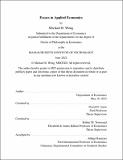Essays in Applied Economics
Author(s)
Wong, Michael B.
DownloadThesis PDF (10.91Mb)
Advisor
Autor, David H.
Townsend, Robert M.
Terms of use
Metadata
Show full item recordAbstract
The first chapter of this dissertation, which is jointly written with Mayara Felix, asks: Who are the winners and losers as businesses increasingly rely on outsourced workers instead of direct employees to perform services such as security and cleaning? How large are the benefits of domestic outsourcing to the economy compared to its costs? To answer these questions, we leverage Brazil's unexpected legalization of outsourcing in 1993, which sharply increased outsourcing among security guards. Using regional variation in the pre-legalization court permissiveness, we find that outsourcing legalization persistently increased total employment of security guards and benefited younger entrant workers. The average wage of security guards also did not fall and may have mildly increased. However, outsourcing legalization also generated a wave of occupational layoffs that reallocated incumbent workers to lower-wage firms. These facts are explained by a model wherein outsourcing both creates productive efficiencies and reduces worker bargaining power. Seen through the model, our estimates imply that one to five years of the annual efficiency gains from outsourcing legalization would exceed the total earnings losses of laid-off incumbents.
The second chapter analyzes how the introduction of a digital currency to a barter community in Toronto affected the volume of trade. The community initially banned cash, but subsequently introduced a digital token that could be transferred among users and redeemed at designated local stores for retail goods. Using comprehensive transactions data, I show that a large monetary expansion persistently increased transaction volume by 70% by enabling monetized trade. However, when token redemption was suddenly halted at a subset of stores, a run on the token ensued and both money-mediated and barter trade volume fell. The findings are most consistent with the predictions of a search-theoretic model wherein money functions as a medium of exchange.
The final chapter studies the effects of partial public housing privatization in Hong Kong. Between 1998 and 2006, Hong Kong’s Tenants Purchase Scheme (TPS) sold a large share of public rental housing to sitting tenants but limited the resale and leasing of sold units. Although TPS did not reallocate housing across households, my quasi-experimental estimates reveal that TPS reduced household sizes and increased household incomes in treated estates. These effects are explained by the relaxation of household-size-contingent income limits and unit allocation rules. TPS therefore benefited well-off tenants, but reduced affordable housing availability for low-income residents.
Date issued
2022-05Department
Massachusetts Institute of Technology. Department of EconomicsPublisher
Massachusetts Institute of Technology